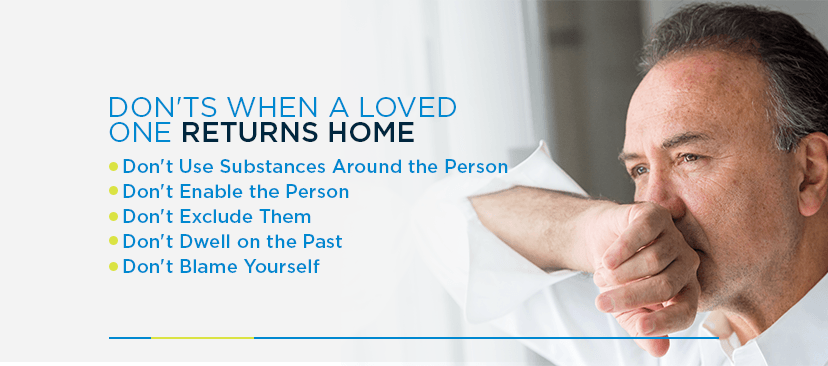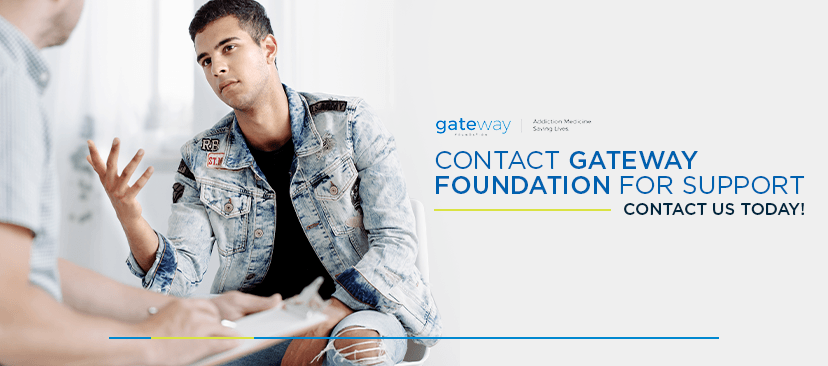- Mar 22
- AddictionRecovery
Friends and family members play a vital role in helping a loved one in recovery. It’s critical to offer love and support to the person in recovery and plan ways to help them stay on track.
As the spouse, friend or family member of a person in recovery, you may feel excited to start a new life with your loved one. Still, helping someone in recovery can feel challenging at times. You may be coping with difficult emotions and stressors of your own. You might also have a lot to learn about addiction and recovery so you can help your loved one effectively. All these factors, plus keeping up with your own responsibilities and self-care, can feel like a lot.
In this post, we’ll provide some guidance and share important do’s and don’ts for helping a person in recovery. If you find yourself feeling overwhelmed and in need of assistance, we’re here to help at Gateway Foundation.
Do’s When a Loved One Returns Home After Treatment
Before your loved one comes home from their treatment program, it helps to prepare for their arrival. Try to create a clean and comfortable home and be ready to help them establish a daily routine. Here are more do’s to help them adjust to life after rehab:
1. Do Encourage New Interests
Before your friend or family member entered treatment, they may have tailored their schedule around substance use. Now that they’re sober, they need to fill their time with meaningful activities to keep them from focusing on cravings or negative emotions.
Hobbies are rewarding activities that can keep a person in recovery busy and help them relieve stress. Encourage your loved one to try something new that interests them, like studying a foreign language or learning how to paint. You might consider picking up a new hobby with them, so you can reconnect and build positive memories together.
2. Do Learn About Recovery
Try to learn as much as you can about recovery so you can set realistic expectations. The more you understand about addiction and recovery, the better you’ll be able to help your loved one stay sober. Start by researching and reading about addiction and any co-occurring disorders your loved one may have. Also, learn about common relapse triggers so you can help your loved one avoid them or cope with them in a healthy way.
3. Do Support Ongoing Treatment
Treatment doesn’t end when a person in recovery comes home from rehab. A person with a substance use disorder needs to continue working with a counselor to address the underlying cause of their addiction.
Encourage your loved one to keep their counseling appointments and attend support group meetings. You might learn about their support group’s concepts so you can apply their philosophy at home. Also, recognize that addiction is a complex disease that often requires outside support. Your loved one can benefit from being around others in recovery who face the same challenges.
4. Do Create a Sober Environment
If a loved one is returning home after rehab, you need to prepare by removing alcohol and other intoxicating substances from the house. If you need to keep medications in the home, make sure they are kept out of sight and locked away. Replace alcohol or drugs with positive and soothing items, like plants or inspiring books. Ultimately, you want the environment to feel comfortable, safe and as stress-free as possible.
5. Do Promote Healthy Choices
Self-care is a critical component of recovery. Remind your loved one that practicing self-care is not selfish. Rather, it is giving themselves what they need. Encourage them to take care of their physical and mental health by making healthy choices, like getting exercise, sleeping well and eating nutritious foods. Following a healthy lifestyle will help your loved one relieve their stress and feel good.
6. Do Be Optimistic
Recovery can be challenging at times, but it’s important not to lose hope. Let your loved one know you believe in them, and that they can live a fulfilling and stimulating life without drugs or alcohol.
According to a 2017 study published in Drug and Alcohol Dependence, 9.1% of the adult population in the United States resolved a significant substance use problem. Remind your loved one that millions of people have successfully recovered from addiction and went on to live their dreams.
7. Do Show That You Care
Show the person in recovery you care by letting them know you’re available and inviting them to talk to about their fears, concerns and plans for overcoming challenges. Share positive words whenever you can to help your loved one feel valued.
8. Do Take Care of Yourself
You don’t have to face the challenges of a loved one’s recovery alone. Consider joining a support group for comfort and to learn coping strategies. If you need time to recharge, don’t be afraid to ask another friend or family member to help out. By taking care of yourself, you can offer your best self to your loved one.

Don’ts When a Loved One Returns Home
Although your loved one may face some ups and downs throughout their journey, you’ll want to stay positive. Everyone has good days and bad days, including individuals in recovery and yourself. Here are a few don’ts to keep in mind as you navigate recovery together:
1. Don’t Use Substances Around the Person
It’s important not to drink or use substances around a person in recovery. Instead, find activities you can enjoy with your loved one that do not involve substance use. If you struggle with a substance use disorder yourself, consider reaching out to a treatment center for help.
2. Don’t Enable the Person
Be careful not to engage in enabling behavior, and let your loved one take responsibility for their actions. For example, if a person loses their job due to drinking, enabling behavior would be to offer financial assistance. You’ll help your loved one more by holding them accountable for their actions and letting them learn from their mistakes.
3. Don’t Exclude Them
Try to include your loved one in social activities to help them adjust to their new lifestyle. This may involve spending time with them surrounded by a new group of sober friends or inviting them to tag along on a day trip. Overall, you don’t want to make your loved one feel different because they are in recovery. Reassure them that they are loved and appreciated.
4. Don’t Dwell on the Past
When your loved one comes home from a treatment program, they must enter a welcoming, positive environment. It’s best to avoid bringing up pain from the past as your loved one heals. Instead, focus on rebuilding your relationship and sharing a substance-free future.
5. Don’t Blame Yourself
Remember that you are not the cause of your loved one’s addiction, and release any guilt you may feel. By recognizing that their substance use disorder is not your fault, you can avoid enabling behaviors and let them take responsibility for their actions.

Contact Gateway Foundation for Support
When someone you love struggles with addiction, it can take a toll on you emotionally. You may be experiencing a range of emotions resulting from the person’s behavior while wanting to help them at the same time. Addiction is a disease that no one has to face alone — including family members of those with a substance use disorder. At Gateway Foundation, we’re here for you and your loved one.
Gateway Foundation is an addiction treatment center with locations throughout Illinois. We offer a range of evidence-based treatments to help individuals overcome their addiction to drugs or alcohol and enter recovery with long-term support. To learn more about our treatment programs and support services, please contact us today.


